http://www.ricfrancis.net

Ethiopian coffee farmers are involved in a five year program to teach them to diversify their source of income: The Livelihood Diversification for Smallholder Coffee Farmers program.
The program, funded by the Green Mountain Coffee Roasters and supported by Catholic Relief Services, is also being implemented in Kenya and Rwanda. It’s designed to increase food security and access to financial services through the introduction of small ruminant (sheep or cow) rearing/fattening, oxen fattening, bee keeping (honey production), Farmer Field Schools and Savings and Internal Lending (SILC) groups.
What follows are photographs (20) of Ethiopian coffee farmers and communities involved in the program:

Oromia region (Gelan District) – Workers at the Oromia Coffee Farmers Cooperative Union (OCFCU) Ltd. processing coffee beans.

Oromia region (Gelan District) – Men at OCFCU process sacks of coffee beans for cleaning.

Debeka Village – Ayele Dergaso, 65, with assistance from his son Astarke Ayele, 25, digs up sweet potatoes.

Debeka Village – Ayantu Gumi, 45, makes Ethiopian coffee by first roasting coffee beans. Afterwards the beans will be ground in a wooden mortar and then brewed in a Jebena (a pottery boiling pot).
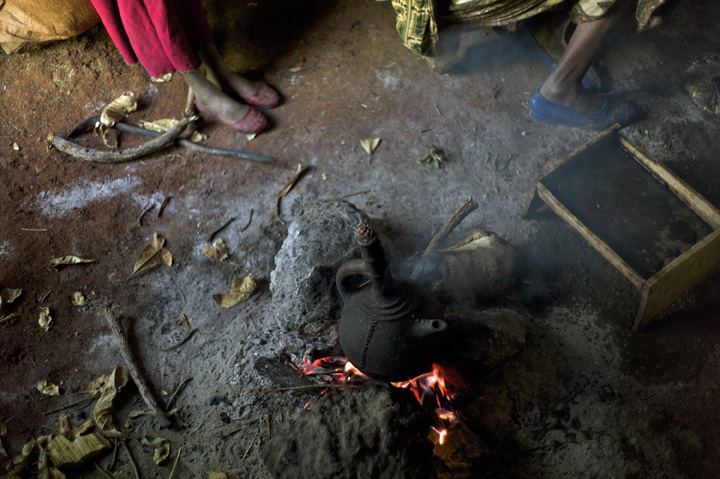
Debeka Village – Freshly roasted coffee is brewed in a Jabena.

Debeka Village – Neighbors and family members relax over coffee and sweet potatoes.

Debeka Village – Martha Wakayo, 18, Ayantu Gumi, 45, and Tamru Ayele, 12, converse with other family members and neighbors.

Debeka Village – Ayele Dergaso, 65, right, shares coffee with neighbors Adane Washola, 15, left, Tamrat Gelgele, 24, third from left, and his son Fekadu Ayelel, 14.

Debeka Village – Children go about their way on a very hot afternoon.

Magala Lemefa Village – Abbiti Shorre, 6 (foreground), Abreham Shorre, 8 (center-blue shirt) and Gete Shorre, 10 (directly behind Abreham) walk to school.

Bochesa Village – Abiti Tariku, 8, plays with a one-week old lamb on the grounds of his grandmother’s coffee field

Magala Lemefa Village – Hirbaye Shorre, 46, stands idle after trimming False Banana trees on the grounds of her coffee field, while her cow feeds and a grandchild plays; she owns two coffee fields in separate villages.
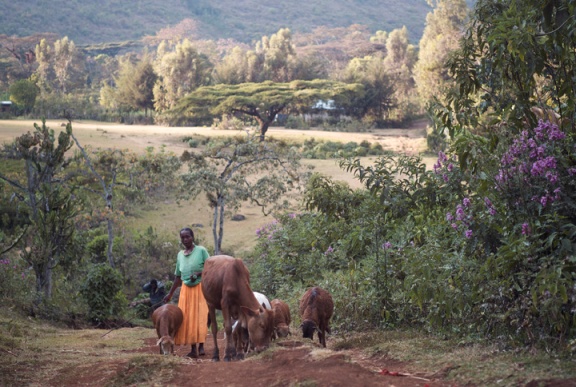
Bochesa Village – Hirbaye Shorre herds her cow and sheep home after they grazed at her coffee field.
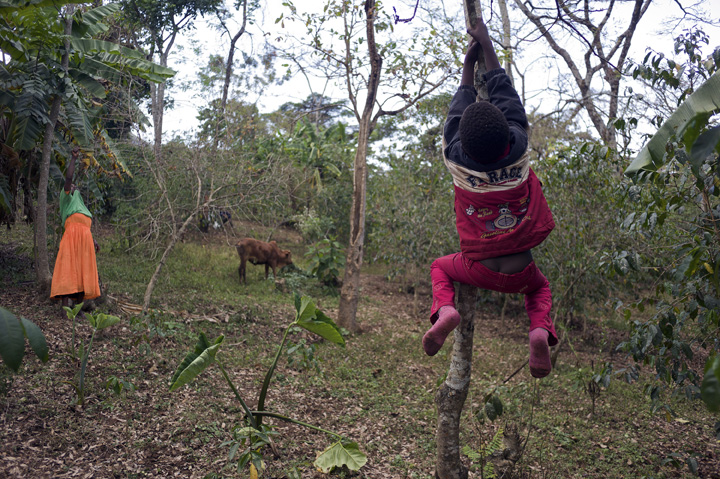
Bochesa Village – Hirbaye Shorre walks around her coffee field picking the few coffee beans that were not harvested, while her grandson plays in a tree.

Magala Lemefa Village – Bekelech Shorre, 15, collects an empty coffee cup from her four-year old cousin, Jaleta Tariku.

Ejersa Fora Village – A farmer displays green onions and ginger for sale at the Wacheray Market.

Ejersa Fora Village – A farmer sells peppers to a young girl.

Ejersa Fora Village – Adnech Gocha unties rope from the legs of her sheep.

Ejersa Fora Village – Before the start of the Livelihood Diversification for Smallholder Coffee Farmers program, locals would informally gather to collect money to loan to one another; after the program began they converted their traditional money collecting methods into this Savings and Internal Lending Community (SILC) group.

Ejersa Fora Village – Adnech Gocha, 42, sells Kocho (a food made from False Banana trees) to customers at the Wacheray Market.
Additional photographs by Ric Francis may be viewed at www.ricfrancis.net.
http://www.ricfrancis.net
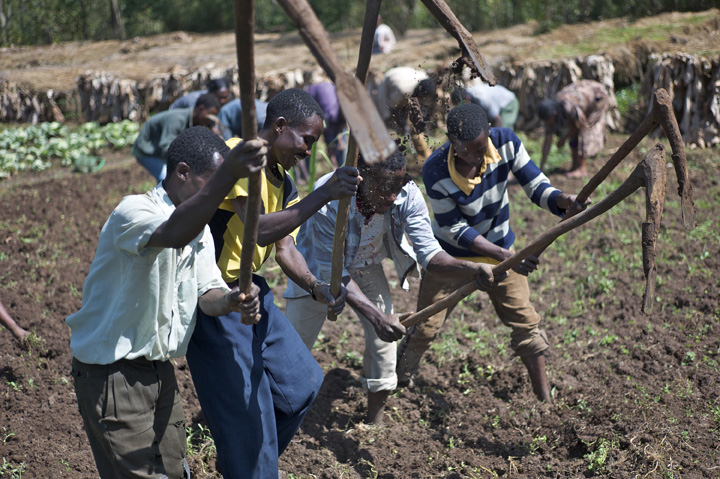
Buoyed by rhythmic chants the farmers swung their labor intensive agricultural hand tools in unison, each motivating the other to move swiftly, tirelessly and happily as they prepared a field for seeding at the farmer field school (FFS) in Fogi Village, Ethiopia.

It is late morning and the sun bathes the farmers with its rays, yet despite the heat and hard work it is apparent these men and women could not be happier. As members of a farmer field school they’re linked by camaraderie and an urgency to improve the lives of their families. Eighteen members of the Wolda Misoma Group (a Savings and Internal Lending Community Group – SILC) own and operate this school, created with the assistance of the Ethio-Wetlands and Natural Resources Association (EWNRA), as part of the Livelihood Diversification for Smallholder Coffee Farmers program in Ethiopia. The program is funded by Green Mountain Coffee Roasters (GMCR) and supported by Catholic Relief Services (CRS). This five year program, which has also been implemented in Kenya and Rwanda, is designed to increase food security and access to financial services through the introduction of small ruminant (sheep or cow) rearing/fattening, oxen fattening, bee keeping (honey production), Savings and Internal Lending (SILC) groups and Farmer Field Schools (FFS).

Farmer field schools fall under the category of farmer groups which are informal organizations whose members have similar interests. Farmer groups also include SILC, Seed Growers, Marketing, and Irrigation Users. During an interview with members of the FFS, Getu Jebo, 25 (head of the school, married with five children), and Bikila Tero, 25 (married with four children), they discussed how the school grew out of the Wolda Misoma (SILC) Group. Before the creation of the school EWNRA trained field agents (such as Mr. Tero) to organize SILC groups in the area. Afterwards EWNRA searched for a strong SILC group through which it could execute its idea for a farmer field school. The idea for the FFS came from a need to ensure the sustainability of different interventions, implemented by the Livelihood Diversification for Smallholder Coffee Farmers program.
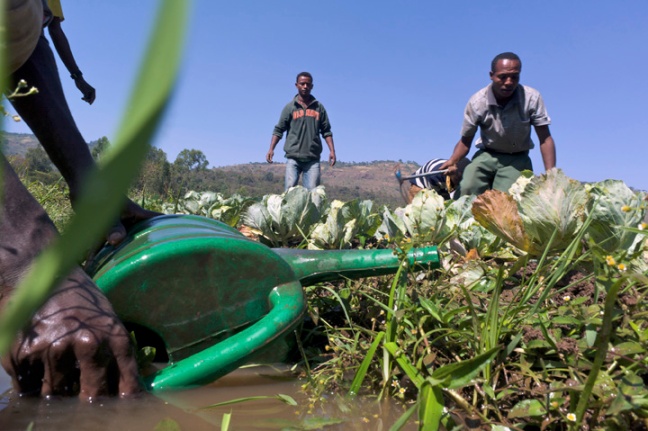
This meshed perfectly with Wolda Misoma Group members who recognized the importance of diversifying crops and income while providing their village with vegetables. “In this area consumption of vegetables has not been a firmly established part of our diet. We saw vegetables when we visited urban areas but we didn’t understand their importance. Our attitude has changed because of the FFS,” stated Mr. Tero. He and Mr. Jebo agreed that all of the group’s members have benefited from the school learning how to grow a variety of vegetables, e.g., carrots, cabbage and onions, while also becoming more efficient as coffee farmers through the use of improved spacing techniques.

The members were excited about the idea of starting a FFS and receiving training that would otherwise be unavailable individually. So after calling their interest to the attention of EWNRA, this implementing partner made an agreement with local government administrators and secured rented land (0.35 hectare for three years for 3000 Birr – 19 Birr equals $1.00) for the school. Initially EWNRA provided training to four FFS members who then shared the knowledge with the group. The project has provided the school with seed, farming tools, watering cans and experts on how to properly plant, manage and harvest crops.

The school provides the added benefit of educating passing locals who observe how vegetables are grown and replicate the lessons at home. Every tuesday and thursday the eighteen members work collectively in the field from 9:00 a.m. until noon. Daily they work in pairs, each responsible for watering three beds of coffee seedlings mornings and evenings; there are 33 coffee seedling beds.
The school embodies the concept of “each one, teach one.” “We commonly work happily together. We use songs to motivate one another and to tease, particularly if someone is having a low-energy day,” said Mr. Jebo laughingly. Everyone is rewarded for their efforts with free vegetables; if there’s a surplus harvest it’s sold at the market.
“In the future we plan to expand production to utilize all of the school’s land to include maize, and fence the area off through the creation of a live fence,” stated Mr. Jebo. The live fence would be made using elephant grass which could also serve as feed.

The concept of “each one, teach one” is indeed the essence of the farmer field school.
Additional photographs by Ric Francis may be viewed at www.ricfrancis.net.



























